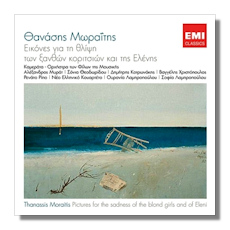
The Internet's Premier Classical Music Source
Related Links
- Latest Reviews
- More Reviews
-
By Composer
-
Collections
DVD & Blu-ray
Books
Concert Reviews
Articles/Interviews
Software
Audio
Search Amazon
Recommended Links
Site News
 CD Review
CD Review
Thanassis Moraitis

Eikones Gia Tin Thlipsi Ton Xanthon Koritsion Kai Tis Elenis
- A Cycle of Songs on Poems by Greek Poet Kostas Karyotakis 1
- Elegy for solo violoncello 2
- String Quartet #1 3
- Amsterdam Concerto 4
- Stories of Grandma Sea 5
- Fajum 6
1 Sonia Theodoridou, soprano
1 Vangellis Christopoulos, oboe
2,5,6 Renato Ripo, cello
4 Dimitris Kotronakis, guitar
5 Vassilis Liarmakopoulos, double bass
5 Ourania Lampropoulou, dulcimer (santouri)
5 Takis Farazis, harpsichord and conductor
6 Sofia Lampropoulos, quanun
6 Socrates Sinopoulos, lira of Istanbul
6 Charis Lambrakis, ney
6 Vangellis Zografos, double bass
6 Thanassis Moraitis, conductor
3 New Hellenic Quartet
1,4 Megaron Orchestra/Alexandros Myrat
EMI Classics 50999-07553-2 DDD 2CDs 68:48, 67:54
Judging from his photograph, Thanassis Moraitis (Θανάσης Μωραΐτης) is a relatively young man. Biographical information is hard to come by, but I gather that, in addition to being a composer, he is a singer (associated, for example, with works by his more famous countrymen Manos Hadjidakis and Mikis Theodorakis), and also a scholar of Greek Demotic and Byzantine music. I had no idea what to expect from this CD, when it was sent to me by guitarist Dimitris Kotronakis, who is one of the performers. It turns out that I was very pleasantly surprised by Moraitis's music, which bears some resemblances to that of Giya Kancheli and the late Henryk Górecki. (ECM New Series, take note!)
This set's omnibus title is "Pictures for the sadness of the blond girls and of Eleni" (Εικόνες για τη θλίψη των ξανθών κοριτσιών και της Ελένης). A great title, that, although it doesn't seem to refer directly to any of the works included here. The first and most substantial offering, however, is the song cycle, which is over 45 minutes long and in five sections. My guess is that this collection's title also comes from poet Kostas Karyotakis – the cycle's texts are steeped in similar melancholy. This is autumnal music, a sort of Das Lied von der Erde with a slightly more "pop" sensibility, and with the drunkard's wine replaced by ouzo. Soprano Sonia Theodoridou has a gorgeous voice, and she unstintingly conveys the texts' grief-laden content. (The booklet provides English translations.)
Next up is the eight-minute Elegy for solo cello, and a String Quartet in two connected movements. It requires just 12 minutes. These are similarly intense works, although the String Quartet is lightened a little by the inclusion of what sounds like folk-inspired material. These too are very well performed. The closeness of the microphoning emphasizes the grit in cellist Renato Ripo's tone, but the effect is more expressive than frankly unpleasant.
The second CD opens with the Amsterdam Concerto for guitar and orchestra, so called because Moraitis composed the bulk of it in that city in 2000, while on tour as a performer. This is an honest-to-goodness classical concerto for guitar and strings, composed in a modern style, but sufficiently tonal and tuneful to keep even skeptical listeners engaged. The slashing rhythms of the third movement, which alternate with restlessly wandering melodies from both the strings and the soloist, are particularly attractive. I'd say this concerto is ready for export. The same holds true for Kotronakis's playing; as I noted in an earlier review of Clear Note 160999, Kotronakis is deserving of international attention as well, with his rock-solid technique and musicality. Here, though, the string orchestra sounds a little shrill and dry; I can't tell if this is a function of the engineering, or part of their actual sound.
The last two works incorporate folk instruments to good effect. The mysterious and atmospheric Stories of grandma sea retains its interest over the course of 22 subtly variegated minutes, which build to a fine and moving climax, thanks in large part to the interesting timbral interactions between the santouri (a Greek version of the hammered dulcimer) and the harpsichord. Unfortunately, I don't know for sure who or what Fajum is, but I think the title might allude to the Egyptian city of Faiyum noted for its waterwheels and mummies. The instrumentation suggests that this might be the case. The quanun is related to the zither, the ney is a kind of flute, and the "lira of Istanbul" (or "lyra") is not currency, I think, but a small bowed instrument with a plaintive timbre. The soulful Fajum allows these three instruments to shine individually and to interact with one another, supported by cello and double bass. The music's gentle and sensuous insinuations suggest the soundtrack to a film not yet made by director Atom Egoyan!
This collection might be difficult to find, but according to Kotronakis's website, you can download it via iTunes. I believe it would be well worth your effort to do so!
Copyright © 2011, Raymond Tuttle













